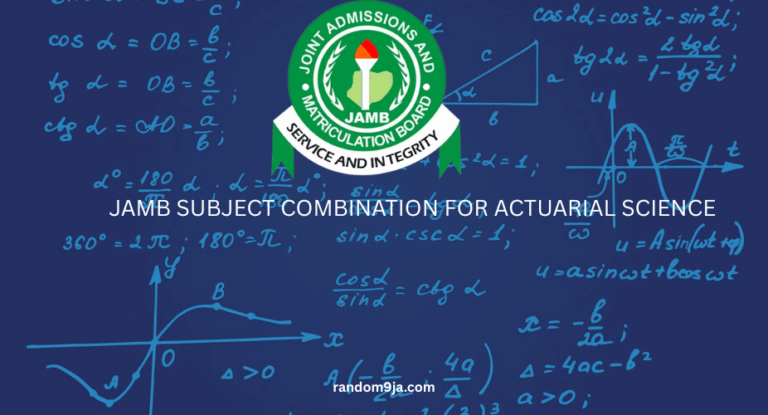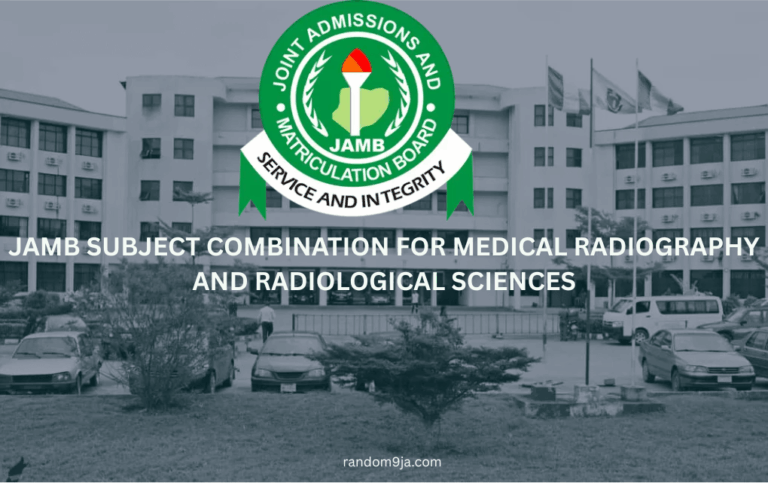JAMB Subject Combination for Agriculture 2026/227 – Full Admission Guide (2025/2026)
For thousands of students aspiring to study Agriculture in Nigerian universities, the first step toward gaining admission is selecting the correct JAMB subject combination. Choosing the wrong subjects during UTME registration is one of the most common mistakes applicants make, often resulting in automatic disqualification—even if they score very high.
This complete guide explains everything you need to know about studying Agriculture, including the JAMB subject combination, WAEC/NECO requirements, Direct Entry qualifications, UTME cut-off marks, top schools offering the course, and admission-boosting tips. It is written in a natural, human-sounding style, SEO-optimized, and over 1500 words for comprehensive coverage.
What is Agriculture as a Course?
Agriculture as a university course focuses on the science and management of crop and animal production. It involves using modern scientific, technical, environmental, and economic principles to improve farming systems, food production, processing, and sustainability.
Agriculture covers several broad areas such as:
-
Crop Science
-
Animal Science
-
Soil Science
-
Agricultural Extension
-
Agricultural Economics
-
Fisheries
-
Forestry
-
Agronomy
-
Agricultural Mechanization
-
Food Science and Technology
The course equips students with the knowledge to solve agricultural challenges, adopt new technologies, improve productivity, manage resources, and drive innovation in the agricultural sector.
Because of its broad nature, universities may offer Agriculture as a single degree (B.Agric or B.Sc Agriculture) or as specialized degree programs under the Faculty of Agriculture.
JAMB Subject Combination for Agriculture
The official JAMB subject combination for Agriculture is:
-
English Language (compulsory for all UTME candidates)
-
Chemistry
-
Biology or Agricultural Science
-
Mathematics or Physics
This combination is accepted by all accredited universities in Nigeria offering Agriculture.
Why These Subjects Are Required
-
English Language: Essential for writing, communication, field reporting, and research documentation.
-
Chemistry: Important for understanding soil chemistry, fertilizers, pesticides, livestock nutrition, and agricultural biochemistry.
-
Biology/Agricultural Science: Gives foundational knowledge of plant and animal life, ecosystems, growth processes, and biological cycles.
-
Mathematics/Physics: Needed for farm measurements, agricultural engineering, mechanization, irrigation systems, data analysis, and scientific calculations.
Agriculture is both a science and a technical course, hence the heavy emphasis on science-based subjects.
WAEC/NECO/GCE O’level Requirements for Agriculture
To be eligible for admission, candidates must have at least five (5) credit passes in relevant subjects in not more than two sittings.
Compulsory O’level subjects include:
-
English Language
-
Mathematics
-
Chemistry
-
Biology or Agricultural Science
-
Any one of the following:
-
Physics
-
Geography
-
Economics
-
Further Mathematics
-
Animal Husbandry
-
Forestry
-
Fishery
-
Note:
-
Some universities prefer Biology over Agricultural Science.
-
Most schools accept Agricultural Science as long as Chemistry and English are credit passes.
-
Credit in Physics increases your chances for specialized agricultural programs like Mechanization or Soil Science.
Direct Entry Requirements for Agriculture
If you want to apply through Direct Entry into 200 or 300 level, the following qualifications are acceptable:
1. A’Level Requirements
Two A-Level passes in:
-
Chemistry
-
Biology
-
Agricultural Science
-
Physics
-
Mathematics
2. ND/HND Requirements
Applicants must have a Upper Credit or Distinction in:
-
Agricultural Technology
-
Animal Health
-
Crop Production
-
Agricultural Extension
-
Forestry
-
Fishery
-
Food Science Technology
3. NCE Requirements
NCE candidates with merit in Agricultural Science and one other science subject are eligible.
Universities That Offer Agriculture in Nigeria
Below are some top universities offering Agriculture or related agricultural programs in Nigeria:
-
University of Ibadan (UI)
-
Ahmadu Bello University (ABU)
-
University of Nigeria, Nsukka (UNN)
-
Federal University of Agriculture, Abeokuta (FUNAAB)
-
University of Ilorin (UNILORIN)
-
Obafemi Awolowo University (OAU)
-
University of Port Harcourt (UNIPORT)
-
Federal University of Technology, Akure (FUTA)
-
Bayero University Kano (BUK)
-
Rivers State University
-
Delta State University (DELSU)
-
Lagos State University (LASU)
-
Nasarawa State University
-
Federal University, Dutse
-
Federal University of Dutsin-Ma
-
Taraba State University
Almost all federal and state universities have a Faculty of Agriculture, so applicants have plenty of options.
JAMB Cut-off Mark for Agriculture
The general JAMB cut-off mark for Agriculture is:
160 (Minimum UTME Requirement)
However, the more competitive universities set higher cut-off marks:
-
UNILORIN: 180–200
-
UI: 200+
-
UNN: 180+
-
FUNAAB: 180+
-
ABU: 180–190
-
OAU: 200+
To increase your chances of admission, target a score of at least:
200 and above.
This gives you a strong edge over other applicants.
Is Agriculture a Good Course in Nigeria?
Yes, Agriculture is one of the most valuable and future-relevant courses in Nigeria. Here are key reasons why:
1. High Demand for Agricultural Experts
Nigeria needs professionals to solve food shortages, improve farming practices, and support agribusiness growth.
2. Abundant Career Opportunities
Graduates can work in government agencies, agro-companies, food industries, research centers, NGOs, consulting firms, and international organizations.
3. Entrepreneurship Opportunities
Agriculture allows graduates to start their own businesses in:
-
Fish farming
-
Poultry
-
Crop production
-
Agro-processing
-
Snail farming
-
Feed production
-
Food packaging
4. Access to Local and International Funding
Agricultural startups have access to grants, loans, and international scholarships.
5. Agriculture is Future-Proof
World population growth means agriculture will always be relevant.
Specializations Within Agriculture
Students studying Agriculture can specialize in several areas:
1. Agronomy
Focuses on crop production, soil management, and sustainable farming.
2. Animal Science
Deals with livestock management, nutrition, genetics, and health.
3. Agricultural Economics
Studies farm economics, agribusiness, and agricultural policies.
4. Soil Science
Focuses on soil fertility, conservation, and land management.
5. Agricultural Extension & Rural Development
Trains students to educate farmers and improve farming communities.
6. Fisheries & Aquaculture
Covers fish production, processing, marine farming, and aquatic environment management.
7. Forestry & Wildlife Management
Focuses on natural resources, biodiversity, and environmental conservation.
Each specialization has its own unique career opportunities.
Career Opportunities for Agriculture Graduates
One major advantage of studying Agriculture is the wide range of lucrative job opportunities. Graduates can work in:
Government Agencies
Such as:
-
Ministry of Agriculture
-
National Root Crops Research Institute
-
Agricultural Research Council of Nigeria
-
Forestry Research Institute
-
NAFDAC (food regulation roles)
-
SON (standards and quality control)
Private Sector Jobs
Agriculture graduates are in demand in:
-
Agribusiness companies
-
Food packaging factories
-
Breweries
-
Fertilizer companies
-
Seed production companies
-
Animal feed manufacturers
-
Oil mills
-
Food and beverage companies
-
Agro-processing firms
NGOs and International Organizations
Including:
-
FAO
-
UNDP
-
World Food Programme
-
USAID
-
IFAD
Entrepreneurship
Graduates can start businesses such as:
-
Poultry farming
-
Catfish farming
-
Vegetable farming
-
Snail farming
-
Beekeeping
-
Agricultural consultancy
-
Fertilizer distribution
-
Seedling production
Academic and Research Careers
For those interested in research and teaching.
Clearly, Agriculture opens the door to numerous career paths, making it one of the most flexible courses.
Common Mistakes Students Make When Choosing JAMB Subjects for Agriculture
Every year, thousands of applicants lose admission because of simple errors. Avoid these common mistakes:
1. Choosing Economics Instead of Chemistry
Economics is NOT required for Agriculture.
2. Selecting Agricultural Science Without Chemistry
Chemistry is compulsory in all universities.
3. Choosing non-science subjects like Government, CRS, or Literature
These have no relevance to Agriculture.
4. Mix of art and science subjects
Agriculture is strictly a science course.
5. Failing to credit Mathematics or English
These are mandatory for admission.
Be sure your JAMB and O’level subjects match the course requirements.
Expert Tips to Secure Admission to Study Agriculture
Here are powerful tips to boost your admission chances:
1. Aim for a High UTME Score
Even though the minimum is 160, score 200+ for competitive universities.
2. Upload Your O’level Results Early
Many candidates miss admission because of delays.
3. Choose the Correct Subject Combination
This saves you from automatic disqualification.
4. Perform Well in Post-UTME
Post-UTME scores are combined with UTME for aggregate scoring.
5. Apply to Less Competitive Schools If Needed
Schools like FUNAAB and ABU are good, but also highly competitive.
6. Use One Sitting If Possible
Some schools prefer one-sitting O’level results.
7. Ensure Your O’level Credits Match Your UTME Subjects
This consistency helps with screening and verification.
Read Also: JAMB Subject Combination for Marketing 2026/2027 – Complete Admission Guide
The correct JAMB subject combination for Agriculture is:
-
English Language
-
Chemistry
-
Biology or Agricultural Science
-
Mathematics or Physics
Additionally, candidates must have the required WAEC/NECO subjects, meet the UTME cut-off mark, and pass the post-UTME.






